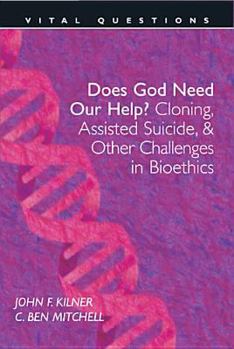Does God Need Our Help?: Cloning, Assisted Suicide, & Other Challenges in Bioethics
Select Format
Select Condition 
Book Overview
The Vital Questions series presents the thinking of knowledgeable, qualified authors on "vital questions" that Christians should be able to discuss intelligently. These concise books provide... This description may be from another edition of this product.
Format:Hardcover
Language:English
ISBN:0842374469
ISBN13:9780842374460
Release Date:April 2003
Publisher:Tyndale House Publishers
Length:236 Pages
Weight:0.55 lbs.
Dimensions:0.8" x 4.4" x 6.6"
Customer Reviews
2 ratings
The Quiet Revolution--Biotechnology
Published by Thriftbooks.com User , 21 years ago
The Quiet Revolution-BiotechnologyA review of the book Does God Need Our Help?: Cloning, Assisted Suicide, & Other Challenges in Bioethics by John F. Kilner and C. Ben Mitchell, Tyndale House Publishers, Inc., Wheaton, Illinois, 2003. While the 20th century was marked by social utopian movements such as Nazism and Communism, the 21st century heralds a new utopian effort based on recent biotechnological advance. This aim of this new biotechnology revolution is not the transformation of social structures per se, but rather the radical reformation of humanity itself. Some social scientists such as Francis Fukuyama now write nervously of a potential "posthuman future" as a result of this rapid technological advance. As Dr. Leon Kass reminds us, "No friend of humanity cheers for a posthuman future." Surely we have all read recent reports on such issues as the Human Genome Project, stem cell research, genetic therapy, and cloning. Many of these issues seem technical, difficult to understand, and remote from our every day lives. Nevertheless such research continues in laboratories and medical centers around the world in a relatively quiet but unrelenting fashion for now. Rest assured that strong economic and social forces will ensure that these technological breakthroughs will soon demand attention in the medical marketplace. While some discoveries show great promise (such as gene therapy for diabetes and Parkinson's disease), others are morally problematic for us as Christians (such as human cloning and embryo research). The speed with which such discoveries now impact us and the ethical subtleties they entail leave many of us mentally giddy. Fortunately this work by two premier evangelical Christian bioethicists, John Kilner and Ben Mitchell, help to provide us with a useful primer for understanding and responding to the resultant bioethical issues. Their work is aimed at a general audience and nontechnical language prevails throughout the book. Kilner and Mitchell begin by mapping out the prevailing secular ethical approaches to these issues-consequentialist, principalist, and virtue ethics (see the book for details). They go on to show how the Christian ethical approach (which is God-centered, reality-bounded, and love-impelled) is superior to all of the secular alternatives. Great pains are taken by the writers to emphasize the biblical principles that bear on biotechnology issues grounding them in the concept that human beings are the special creation of God as man and woman bear His very image (imago dei). We are not simply "computers made of meat" as Marvin Minsky suggests. Kilner and Mitchell go on to note that all of creation is now fallen leading to human suffering which makes the use of morally legitimate biotechnology research an endeavor worthy of our support. We as concerned Christians are not to be simply nattering nabobs of negativity in this matter. Gene therapy and adult stem cell research, for example, show great promi
From one of the authors
Published by Thriftbooks.com User , 21 years ago
This is not another academic book on bioethics. Rather than writing for the academy, John Kilner and I have tried to write for people with little or no background in science, medicine, or ethics. We begin with the Hippocratic Oath, moving through beginning of life and end of life decisions. We end with the emerging biotechnologies and the benefits and burdens they present. Finally, we include suggested readings and resources for further study and study questions to make the book useful for small group discussions.This book was designed for those who are struggling ethical decisions about their health care or for those who want to know more about stem cell research, cloning, reproductive technologies, euthanasia, resource allocation, and other issues.My colleague, John Kilner, PhD., is a graduate of Yale University, Gordon Conwell Seminary, and Harvard University. He is currently President of the Center for Bioethics & Human Dignity, just north of Chicago, Illinois. I am associate professor of bioethics and contemporary culture at Trinity International University, in Deerfield, Illinois, and received my Ph.D. in philosophy with a concentration in medical ethics from the University of Tennessee, Knoxville.





